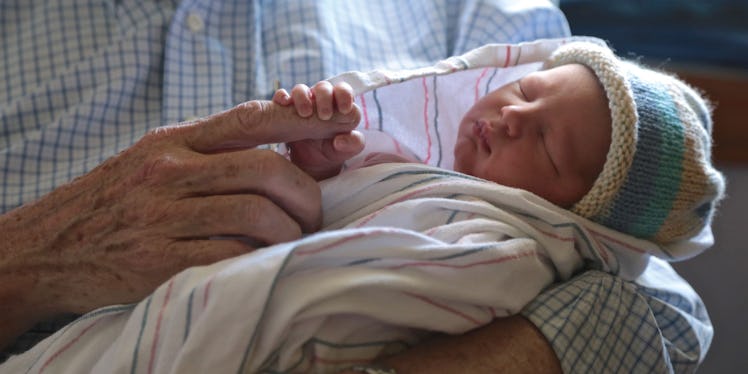The Evolutionary Reason Human Babies Are Born Helpless
Chew on that, baby geniuses.

The first few months with a newborn baby are terrifying — we’re a horribly designed species. Our babies are born with soft spots on their heads, necks so fragile that they can die if they aren’t supported, and tiny fingers that can’t even use Snapchat. Evolution was kinder to other animals. Reptiles, for example, don’t even need to take care of their babies. When a lizard gives birth, it expects its one-day-old child to go out on its own, fend for itself, and stop coming to it with every little problem. Their babies can already walk and hunt. Ours can’t even see.
Flickr / NRCharles
How did we, as a species, ever survive? University of Rochester professors Celeste Kidd and Steve Piantadosi who just published a new theory in the Proceedings Of The National Academy Of Sciences about why babies aren’t born to run: It makes for smarter parents. Good news! But, the most fascinating part of their theory is the one they cut out of their research paper. (Hint: It would make for an excellent Netflix series.)
It’s Because We Don’t Lay Eggs
So, the first part to human intelligence are those 11 agonizing hours your wife spent in labor trying to push a human being out of her body. Babies are born before their brains have fully developed. That’s by design. Trying to pass an adult-sized head during delivery is a frightening proposition. More frightening if you’re Peyton or Eli’s mom.
Since babies are born before they’re ready to take care of themselves, that responsibility falls on parents. You might be raising your kid on “expert” mode with all of that feeding, changing, and swaddling, but the extra challenge is what Kidd and Piantadosi believe put us at the top of the biological pyramid.
Dumb Babies Need Smart Parents
Yes, your baby has made you smarter. Well, you and the entire evolutionary chain behind you. They made a handy chart (see above) comparing the intelligence and weaning time of primates. The result was a clear connection: The longer a baby’s weaning time, the smarter the adult animals become. Their evolutionary model, Kidd says, “actually lined up better than we expected.” They found that the helplessness of a baby isn’t just a good predictor of a species’ intelligence – it’s the best.
It Take Brain Power To Keep Babies Alive
The second part of their theory is that because babies are vulnerable, humans had to evolve big brains to keep them alive. If a newborn goat gets attacked by foxes, it can run away. If your newborn gets attacked by foxes, you need to be the one that does the outfoxing. Natural selection doesn’t pull punches — and those not smart enough to protect their baby get cut out of the gene pool. In modern society, replace hungry fox with those sadists who design IKEA cribs.
Flickr / SXBaird
The Truth Is Out There
Kidd and Piantadosi cut one of the more far out ideas from the research, because they were convinced they’d be discredited for it. “It’ll make us sound crazy,” Kidd warned, because it’s about aliens.
According to Kidd and Piantadosi, sci-fi flicks got it wrong with their egg-laying, reptilian xenomorphs. Intelligent life isn’t going to be popping out of your chest. It should actually look a lot like how we have babies.“If we ever meet an intelligent species from another planet,” Piantadosi said, “They’ll have live births. They’ll have premature, very helpless newborns.”
They’ve already established that, the smarter Earth primates are, the more postnatal development they go through, and the longer they stay with their parents. If super intelligent creatures from beyond the stars arrive, it’s more than likely they’ll follow that evolutionary trend. And if aliens turn out to be more Aliens than Alf, Kidd and Piantadosi will owe everyone an apology — but at least they’ll be more fun to hang out with.
This article was originally published on